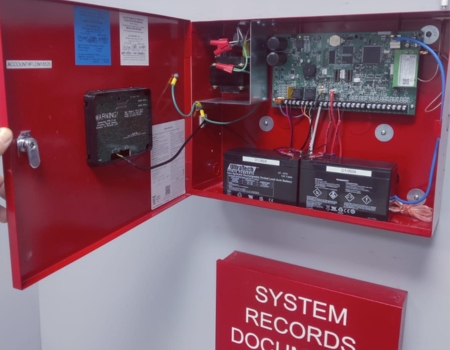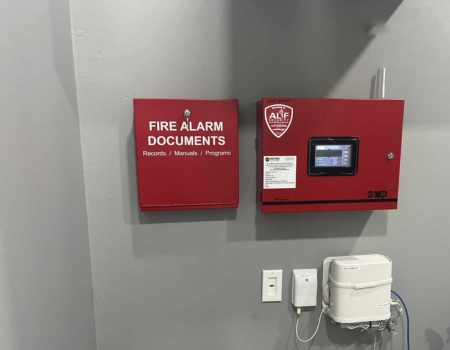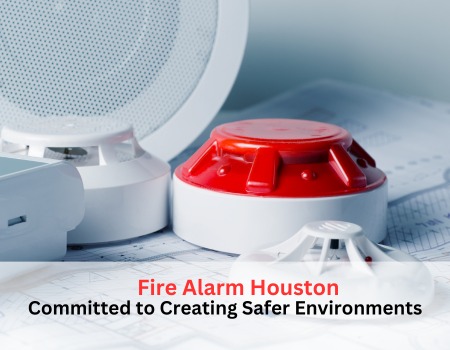How Often Should Fire Alarms Be Replaced? 5 Critical Signs It’s Time for an Upgrade
A fire alarm system is important for the safety of our business and home. But most of the time, after installing this system once, we don't pay much attention to its inspection or replacement. We must not forget that it serves as the first line of defense against fires, alerting occupants and emergency services in the event of a fire outbreak. Like all systems, fire alarms have a limited lifespan and can become outdated or faulty over time. To ensure your fire alarm system is always in optimal working order, it’s essential to recognize when it needs to be replaced. In this article, we'll explore the frequency of fire alarm replacements and the signs that indicate it’s time for an upgrade.
How Often Should Fire Alarms Be Replaced?
The typical lifespan of fire alarms is between 10 and 15 years. Over time, environmental factors such as dust, humidity, and general wear and tear can affect their sensitivity and functionality. Regular inspections, testing, and maintenance help extend the lifespan of the system, but building owners should anticipate replacement as the system nears 15 years.
Fire codes and regulations evolve, and so does fire safety technology. Older systems may not meet current standards or provide the level of protection required by modern buildings. Consulting with a professional can help determine when your system should be replaced or upgraded to comply with newer regulations and technologies.

5 Critical Signs It’s Time to Replace or Upgrade Your Fire Alarm System
- Age of the System: The age of your fire alarm system is the most straightforward indicator that it may be time for an upgrade. If your fire alarm system is more than 15 years old, it may not meet current safety standards. Fire safety technologies have significantly advanced, offering improved detection capabilities, better emergency communication, and more efficient response times. Replacing an aging system ensures you’re benefiting from the latest fire protection innovations.
- Frequent False Alarms: Frequent false alarms are not only a nuisance but can also cause complacency among occupants, leading to slower reactions during real emergencies. False alarms often result from malfunctioning sensors, outdated wiring, or other technical failures within the system. Frequent occurrences may indicate the system is no longer reliable and could compromise safety in an actual fire emergency.
- Inadequate Coverage: As buildings expand or undergo renovations, fire alarm systems may no longer provide adequate coverage. If new rooms, floors, or extensions have been added to your building, the existing system may not monitor all areas effectively. An upgrade is necessary to ensure every space is protected, reducing the risk of fire spreading undetected in unmonitored areas.
- Non-Compliance with Current Codes and Regulations:Building codes and fire safety regulations are regularly updated to improve safety. If your fire alarm system doesn’t comply with the latest codes, your building could face legal liabilities or insurance penalties. Regular reviews by fire safety professionals and updates to the system can help you meet regulatory requirements and ensure continued safety.
- Increased Repair Costs and Difficulty in Maintenance:If you’re consistently spending more on repairs or finding it difficult to source replacement parts, it may be time to invest in a new system. Older systems often use outdated technologies that are no longer supported. Repeated malfunctions and high maintenance costs can make a new fire alarm system more cost-effective in the long run.

Why Should You Upgrade Your Fire Alarm System?
- Comply With Fire Safety Codes: Upgrading ensures compliance with local fire safety regulations, which helps avoid fines, legal issues, and potential insurance complications. Codes change regularly to incorporate new fire safety standards, and a system upgrade can help meet these evolving requirements.
- Reduce False Alarms: Frequent false alarms can erode the credibility of your system. Upgrading reduces sensor malfunctions and ensures more accurate detection, leading to fewer false alarms. This helps prevent unnecessary calls to emergency services and maintains occupant trust.
- Enhanced Troubleshooting and Maintenance: Modern fire alarm systems come equipped with improved control panels that simplify troubleshooting. These systems often feature remote monitoring, allowing building managers to access system alerts and diagnostics via smartphones or computers. Remote access not only makes it easier to maintain the system but also allows for quicker responses to faults.
- Scalability for Future Expansion: If you plan to expand or reconfigure your building, modern fire alarm systems provide greater flexibility. Scalability ensures that adding more sensors or coverage areas won’t disrupt your existing system, helping you maintain full protection as your facility grows.
- Improved Emergency Communication: Many older fire alarm systems rely on sirens and horns to alert occupants. Newer systems offer advanced communication features, including voice alerts and real-time notifications. Some systems even have dedicated radio networks that can communicate directly with emergency services, improving response times during critical situations.
- Reduced Maintenance Costs: An upgraded fire alarm system may significantly reduce the need for frequent repairs and maintenance. Investing in a modern, reliable system reduces ongoing maintenance expenses while providing enhanced fire detection and faster emergency response.
The average fire alarm system lasts about 12 to 15 years, assuming it is regularly inspected and maintained. If you’re nearing the end of that period, it’s a good time to consider an upgrade to ensure reliability and compliance with modern safety standards.
A fire alarm system is a vital part of any building’s safety infrastructure. Keeping it up to date ensures it can respond effectively to emergencies, protecting both lives and property. If your fire alarm system is showing signs of age, experiencing frequent malfunctions, or is no longer compliant with safety codes, it’s time to consider an upgrade. By modernizing your fire alarm system, you’ll benefit from improved detection capabilities, reduced false alarms, easier maintenance, and enhanced emergency communication.
If you think your fire alarm system needs to be replaced, isn’t working properly, or requires an inspection, don’t wait until it’s too late. Ensuring your fire alarm is up to date and fully functional is critical for the safety of your building and its occupants. Contact Fire Alarm Houston today for expert advice, professional inspections, and reliable system upgrades. Our team is here to help you keep your property protected with the latest fire safety technology. Call Now! @ 832-626-7837 or Fill out the Contact Form and we will get back to you.

- Aldine
- Alvin
- Ames
- Anahuac
- Angleton
- Arcola
- Atascocita
- Austin
- Bacliff
- Bailey Prairie
- Barker
- Barrett
- Bay City
- Bayou Vista
- Baytown
- Beach City
- Beasley
- Beaumont
- Bellaire
- Boling
- Bonney
- Brazoria
- Brazos Country
- Brookshire
- Brookside Village
- Bunker Hill Village
- Cedar Park
- Channelview
- Cinco Ranch
- Clear Lake Shores
- Cleveland
- Cloverleaf
- Clute
- Conroe
- Corsicana
- Cove
- Crosby
- Cumings
- Cut And Shoot
- Cypress
- Damon
- Danbury
- Dayton
- Dayton Lakes
- Deer Park
- Dickinson
- East Bernard
- El Lago
- Fairchilds
- Fifth Street
- Fort Bend
- Four Corners
- Freeport
- Fresno
- Friendswood
- Fulshear
- Galena Park
- Galveston
- Grand Prairie
- Greatwood
- Guy
- Hardin
- Harris
- Hedwig Village
- Hempstead
- Highlands
- Hillcrest
- Hilshire Village
- Hitchcock
- Hockley
- Holiday Lakes
- Houston
- Huffman
- Hufsmith
- Humble
- Hungerford
- Hunters Creek Village
- Huntsville
- Iago
- Iowa Colony
- Jacinto City
- Jamaica Beach
- Jersey Village
- Katy
- Kemah
- Kendleton
- Kenefick
- Kingwood
- La Marque
- La Porte
- Lake Jackson
- League City
- Liberty
- Liverpool
- Livingston
- Lorena
- Magnolia
- Manor
- Manvel
- Meadows Place
- Mission Bend
- Missouri City
- Mont Belvieu
- Montgomery
- Morgans Point
- Nassau Bay
- Navasota
- Needville
- New Territory
- North Cleveland
- North Houston
- Oak Island
- Oak Ridge North
- Old River-Winfree
- Orange
- Orchard
- Panorama Village
- Pasadena
- Pattison
- Patton Village
- Pearland
- Pecan Grove
- Pine Island
- Pinehurst CDP
- Piney Point Village
- Pleak
- Plum Grove
- Port Arthur
- Porter
- Porter Heights
- Prairie View
- Richardson
- Richmond
- Richwood
- Roman Forest
- Rosenberg
- Rosharon
- Sabine Pass
- San Antonio
- San Felipe
- San Leon
- Santa Fe
- Seabrook
- Sealy
- Seguin
- Sheldon
- Shenandoah
- Shoreacres
- Silsbee
- Simonton
- South Houston
- Southside Place
- Splendora
- Spring
- Stafford
- Stagecoach
- Sugar Land
- Taylor Lake Village
- Texas City
- The Woodlands
- Thompsons Alief
- Tiki Island
- Todd Mission
- Tomball
- Waller
- Wallis
- Webster
- West Columbia
- West University Place
- Weston Lakes
- Willis
- Woodbranch
- Woodloch


